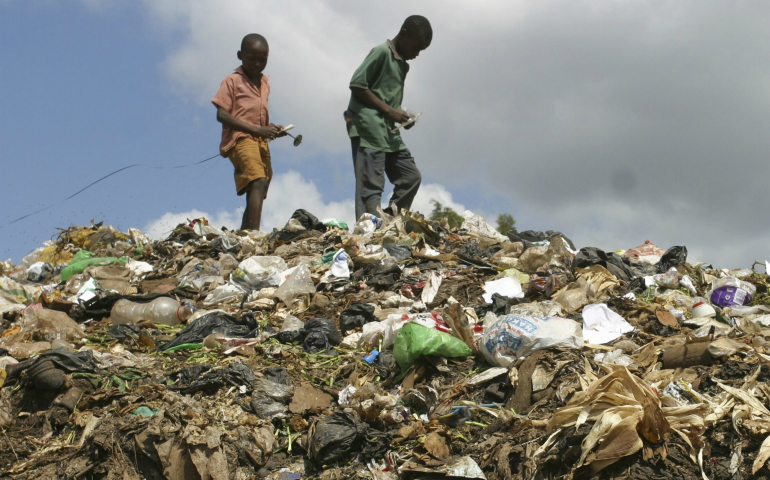
Children from a slum area scavenge through a garbage dump in Nairobi, Kenya, February, 2009. (CNS photo/Noor Khamis, Reuters)
You can't see the Koshe landfill from the Sheraton Hotel in Addis Ababa, Ethiopia. The 293-room hotel, nestled between the National Palace, where the president lives, and the Menelik Palace, where the foreign minister lives, is part of the Starwood Luxury Collection. They say they "relocated" over 500 families for its construction in 1998. They removed another 3,000 families from nearby land to build a shopping mall, a mosque and apartments.
Which brings us across town to the 74-acre Koshe landfill, where hundreds of people were buried by a garbage landslide March 11, and at least 115 were killed.* That's where they lived. That's where their homes were. That's where they stored their hopes and dreams, and not, incidentally, survived on what their rich neighbors threw out.
The Sheraton Addis tells prospective employees on its website that it has "an array of dining options including Italian, French, Indian specialty restaurants," a poolside restaurant, an all-day dining international restaurant, and five bars and lounges.
The city is building a biogas plant atop the Koshe landfill. Survivors who lived there and scavenged for a living blame the landslide on bulldozers flattening the top of the garbage pile they called home.
The Sheraton Addis has a private water treatment plant that "ensures sterilization and bacteria free purification of water." It has generators powerful enough to ignore the city's blackouts and power cuts.
I have never visited the Koshe landfill, but I have been to at least one of the 14 or so favelas in Sao Paulo, Brazil. Real people live there: mothers and fathers and children and babies. They eat and wear what they can. They go to work where they find it.
Then there are the villas miseria in Argentina, and the 400,000-person Khayeltisha slum in Cape Town, South Africa. There are gigantic slums in Nairobi, Kenya, in Mumbai, India, and in Karachi, Pakistan. They say the Neza-Chalco-Itza barrio in Mexico City, Mexico, with close to four million inhabitants, is the largest slum in the world. Compared to the Koshe landfill, it's a high-class suburb.
For better or for worse, millions of people are trapped in various levels of awful situations, with no way to escape. Too many people on the planet are scraping by, depending on other people's garbage. Whether because of landslide or famine or war or just plain old poverty, they must go someplace else.
Why try to come to the United States?
Would a stable government and peaceful streets have anything to do with it? Would educational opportunities and running water be of interest? How about financial opportunities? Or just some food, clothing and a clean place to sleep?
The Sheraton Addis offers bottled water daily, 42-inch televisions and free Wi-Fi, starting at US$211 per night. (Suites run between $461 and $514.)
The per capita income in Ethiopia, the second poorest country in the world, averages $590 (about 13,500 Ethiopian birr).
There are 103 million people in predominantly Christian Ethiopia. Very few are destined to come to the United States.
The lucky ones will find first-degree relatives to sponsor them, perhaps in California, Maryland, Minnesota, Virginia or Texas. In those states, U.S. Census Bureau statistics** count nearly 250,000 Ethiopian-born immigrants and their children who, in 2012 at least, sent U.S. $181 million back home to Ethiopia.
The last time I was in a taxi in the United States, I had an Ethiopian cab driver. He had four or five children, all born here. They were doctors and lawyers and teachers. He had a green card, but the people helping him get citizenship kept cancelling appointments or misplacing paperwork. Then the staffers handling his case moved on, and he lost his contact and had to start all over again with a new person. It had been going on for years. I suggested he turn to the Catholic archdiocese we were traveling in. Oh, he said, they were the ones handling his case.
[Phyllis Zagano is senior research associate-in-residence at Hofstra University in Hempstead, N.Y. Her books include Sacred Silence: Daily Meditations for Lent and In the Image of Christ: Essays on Being Catholic and Female.]
Editor's note: We can send you an email alert every time Phyllis Zagano's column, Just Catholic, is posted. Go to this page and follow directions: Email alert sign-up.
*The original version of this piece has been updated with a more correct count of those that lost their lives in the garbage landslide.
**The original version of this piece has been updated to correct the source of statistics on Ethiopian-born immigrants.


